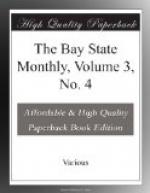Meanwhile preparations for the capture of Sumter had been steadily going on under the direction of General Beauregard, one of the most skilful of engineers. On the 1st of April he telegraphed to Montgomery, the capital of the new confederacy:—
Batteries ready to open Wednesday or Thursday. What instructions?
On the same day orders were issued to stop all courtesies to the garrison, to prohibit all supplies from the city, and to allow no one to depart from the fort. On the 7th Anderson received a confidential letter, under date of April 4th, from President Lincoln, notifying him that a relief expedition would be sent, and requesting him to hold out, if possible, until its arrival.
On the morning of the 8th the following communication from the President was, by special messenger, placed in the hands of Governor Pickens:—
I am directed by the President of the United States to notify you to expect an attempt will be made to supply Fort Sumter with provisions only, and that if such attempt be not resisted, no effort to throw in provisions, arms, or ammunition will be made without further notice, or in case of an attack upon the fort.
This message was at once communicated to Jefferson Davis, at Montgomery, who entertained the opinion that the war should be begun without further delay. On the 10th Beauregard was instructed to demand the evacuation of Fort Sumter, and to reduce it in case of refusal.
On the following day, at two o’clock in the afternoon, General Beauregard sent two of his aids to make the demand; but it was refused. Still another message was sent, with the same result. On the morning of the 12th, at twenty minutes past three o’clock, General Beauregard sent notice to Anderson that he would open fire upon Sumter in one hour from that time.
At half-past four appeared “the first flash from the mortar battery near old Fort Jackson, on the south side of the harbor, and an instant after a bombshell rose in a slow, high curve through the air, and fell upon the fort.”
It was the first gun in the Rebellion. Gun after gun responded to the signal, and through thirty-six hours, without the loss of a single life in the besieged garrison. At noon, on Sunday, the 14th of April, Major Anderson hauled down the flag of the United States, and evacuated Fort Sumter. Before sunset the flag of the Confederate States floated over the ramparts.
The following telegrams were transmitted:—
STEAMSHIP “BALTIC,” OFF SANDY HOOK,
April 18 (1861), 10.30 A.M., via New York.




